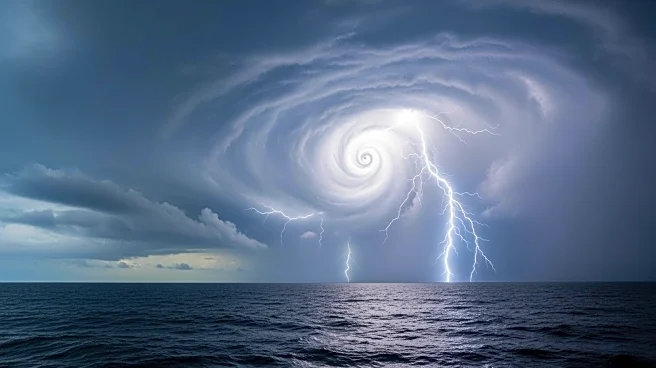What's Happening?
Hurricane Melissa has rapidly intensified into a Category 3 hurricane, posing a significant threat to Jamaica and Haiti with catastrophic flooding and landslides. The storm has already claimed at least four lives, including three in Haiti and one in the
Dominican Republic, where another person remains missing. Forecasters predict up to 35 inches of rain in southwestern Haiti, with Jamaica activating 650 shelters and warning of potential airport closures. The hurricane's slow movement is expected to prolong its dangerous impacts, with maximum potential intensity estimated at 200-230 mph. Authorities in Jamaica have announced the closure of the Norman Manley International Airport in Kingston, while the Sangster airport in Montego Bay remains open for now. The storm has also damaged nearly 200 homes in the Dominican Republic and disrupted water supply systems, affecting over half a million customers.
Why It's Important?
The intensification of Hurricane Melissa into a Category 3 storm poses significant risks to the Caribbean region, particularly Jamaica and Haiti. The potential for catastrophic flooding and landslides could lead to widespread destruction, impacting infrastructure, homes, and the livelihoods of thousands. The closure of airports and activation of shelters in Jamaica indicate the severity of the threat, as authorities prepare for the worst-case scenario. The storm's impact on water supply systems in the Dominican Republic highlights the vulnerability of essential services during such natural disasters. The slow movement of the hurricane increases the duration of its impact, potentially exacerbating the damage and complicating recovery efforts. This situation underscores the importance of disaster preparedness and response in mitigating the effects of severe weather events.
What's Next?
As Hurricane Melissa continues its slow progression, authorities in Jamaica and Haiti are bracing for further impacts. The Jamaican government has activated over 650 shelters and prepositioned food packages for quick distribution, indicating a proactive approach to disaster management. In Haiti, local authorities are organizing food kit distributions, although many residents remain reluctant to evacuate. The Bahamas Department of Meteorology has warned that Melissa could bring tropical storm or hurricane conditions to islands in the Southeast and Central Bahamas and the Turks and Caicos Islands by early next week. The Cuban government has issued a hurricane watch for several provinces, preparing for potential landfall. The ongoing monitoring and response efforts will be crucial in minimizing the storm's impact and ensuring the safety of affected populations.
Beyond the Headlines
The intensification of Hurricane Melissa highlights the broader challenges posed by climate change, as warmer ocean temperatures contribute to more frequent and severe storms. The Caribbean region, already vulnerable to natural disasters, faces increasing risks as climate patterns shift. This situation calls for enhanced international cooperation and investment in climate resilience and adaptation strategies. The ethical dimension of disaster response is also significant, as governments and aid organizations must ensure equitable access to resources and support for all affected communities. Long-term recovery efforts will require sustained attention to rebuilding infrastructure and supporting economic stability in the region.















